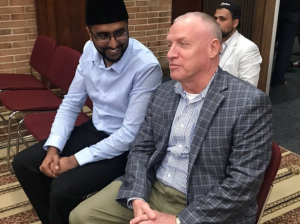#29for29: A Colonel and an Imam
 By Reed Bonadona
By Reed Bonadona
I signed up to participate in the 29 for 29 Ramadan initiative fairly impulsively, out of feeling of general support for Veterans for American Ideals (VFAI) and a sense that I could do more to stand up for the American values I believe in. I was matched with Imam Mahmood Kauser, an Imam of the Ahmadiyya Muslim Community in New York, and we agreed on 5 June as the night of my visit.
My wife sent me a link of FAQs about Ramadan. But that and a recent review essay of books on the Qur’ān constituted the extent of my preparation. I didn’t know much about Islam, especially this sect of it, and as a liberal-humanist agnostic, I was also worried that my lack of religious belief would be an issue, for my hosts and maybe for me. Still, I went in expecting people to be friendly, although maybe not to the extent that they were.
I arrived at the mosque by car from my home at about 1830, earlier than my planned arrival of 1900. (Traffic was light, and I didn’t get lost.) Only a few people were present at the mosque at this time, but a couple of them welcomed me, and we talked for a bit.
Imam Kauser arrived and we talked, then he gave me the grand tour. This was followed by a meal in the pavilion outside, and then prayers. Afterward I made a few remarks about the VFAI mission and thanked my hosts. I wound up sitting around in Kauser’s office until about 2230 talking to some of the other congregants. They wanted very much to explain to me their beliefs and the background of this community, which is the oldest Muslim community in the United States.
Afterwards I was driven to the home of one of the board members, where I spent the night. Reveille was 0330, followed by breakfast prepared by his wife, then back to the mosque for prayers. It was all over by about 0500, after which time I drove home for some more sleep.
The experience was a good one and I learned a lot. I enjoyed the human contacts I made, and I need not have worried about my lack of belief; it came up explicitly only once, during a private conversation on the morning I left.
I hadn’t known that there are 73 sects of Islam, or that my host community has been persecuted by the other denominations, in Pakistan especially. The Ahmadis are apparently very peaceable and progressive. I thought of them at one point as the Unitarians of Islam, although they think of themselves as going back to the real fundamentals, to the text of the Qur’ān. They are “Puritans,” as one man said.
Of course, one night and a wake-up doesn't make me an expert! And I know much more about one sect of Islam than do about the other 72 combined. Still, I feel I know more about Islam than I did. My hosts also gave me a copy of the Qur’ān and a book of essays by their spiritual leader, Mirza Masroor Ahmad, so I’ll have the chance to continue my education.
I talked to Imam Kauser a bit about his relations to the community. He said that they made a strong effort in that direction, but that an immersion experience like mine was bound to be more valuable than the occasional short meeting. I agree. This kind of extended, night-and-day, face-to-face contact is hard to replace as a way of developing understanding.
I would encourage my fellow Americans to also seek out these kinds of opportunities. You may not end up spending the night with a stranger and their family, but perhaps you could share a meal, or visit a place of worship that differs from your own. Reach out and try to truly get to know your neighbors. You may learn something new. You may even make some new friends. And you’ll get to experience firsthand the rich diversity that makes our nation great.
Reed Bonadonna is a former Marine Corps infantry officer and field historian. His book, Soldiers and Civilization: How the Profession of Arms Thought and Fought the Modern World into Existence, was published by the Naval Institute Press last May.

